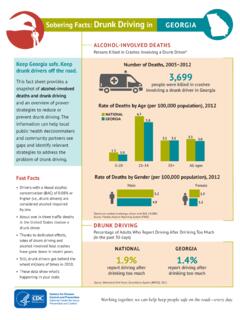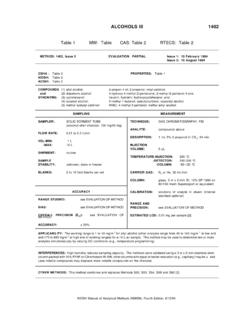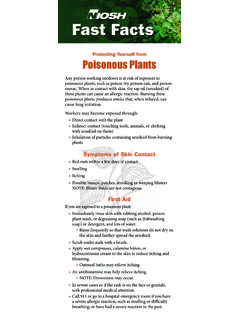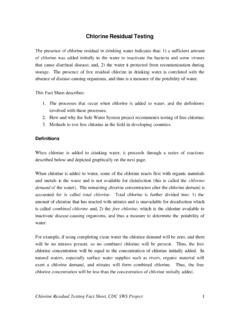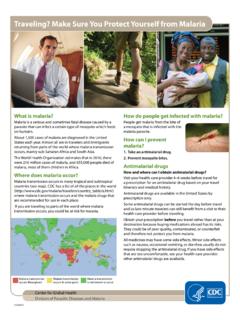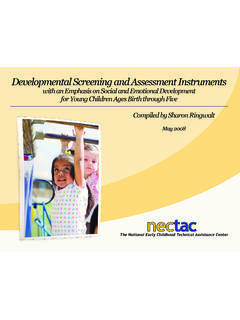Transcription of Your Baby at 2 Months
1 What Most Babies Do at this Age:Social/Emotionalo Begins to smile at peopleo Can briefly calm himself (may bring hands to mouth and suck on hand)o Tries to look at parentLanguage/Communication o Coos, makes gurgling soundso Turns head toward soundsCognitive (learning, thinking, problem-solving) o Pays attention to faceso Begins to follow things with eyes and recognize people at a distanceo Begins to act bored (cries, fussy) if activity doesn t changeMovement/Physical Development o Can hold head up and begins to push up when lying on tummyo Makes smoother movements with arms and legsYour Baby at 2 MonthsChild s Name Child s Age Today s DateHow your child plays, learns, speaks, acts, and moves offers important clues about your child s development. developmental milestones are things most children can do by a certain the milestones your child has reached by the end of 2 Months . Take this with you and talk with your child s doctor at every visit about the milestones your child has reached and what to expect Doesn t respond to loud soundso Doesn t watch things as they moveo Doesn t smile at peopleo Doesn t bring hands to moutho Can t hold head up when pushing up when on tummyTell your child s doctor or nurse if you notice any of these signs of possible developmental delay for this age, and talk with someone in your community who is familiar with services for young children in your area, such as your state s public early intervention program.
2 For more information, go to or call 1-800-CDC-INFO (1-800-232-4636).Act Early by Talking to Your Child s Doctor if Your Child:Adapted from CARING FOR YOUR BABY AND YOUNG CHILD: BIRTH TO AGE 5, Fifth Edition, edited by Steven Shelov and Tanya Remer Altmann 1991, 1993, 1998, 2004, 2009 by the American Academy of Pediatrics and BRIGHT FUTURES: GUIDELINES FOR HEALTH SUPERVISION OF INFANTS, CHILDREN, AND ADOLESCENTS, Third Edition, edited by Joseph Hagan, Jr., Judith S. Shaw, and Paula M. Duncan, 2008, Elk Grove Village, IL: American Academy of Pediatrics. This milestone checklist is not a substitute for a standardized, validated developmental screening the Signs. Act | 1-800-CDC-INFO (1-800-232-4636)What You Can Do for Your 2-Month-Old:Learn the Signs. Act | 1-800-CDC-INFO (1-800-232-4636)o Cuddle, talk, and play with your baby during feeding, dressing, and Help your baby learn to calm herself. It s okay for her to suck on her Begin to help your baby get into a routine, such as sleeping at night more than in the day, and have regular Getting in tune with your baby s likes and dislikes can help you feel more comfortable and Act excited and smile when your baby makes Copy your baby s sounds sometimes, but also use clear Pay attention to your baby s different cries so that you learn to know what he Talk, read, and sing to your Play peek-a-boo.
3 Help your baby play peek-a-boo, Place a baby-safe mirror in your baby s crib so she can look at Look at pictures with your baby and talk about Lay your baby on his tummy when he is awake and put toys near Encourage your baby to lift his head by holding toys at eye level in front of Hold a toy or rattle above your baby s head and encourage her to reach for Hold your baby upright with his feet on the floor. Sing or talk to your baby as he is Your Baby Learn and GrowYou can help your baby learn and grow. Talk, read, sing, and play together every day. Below are some activities to enjoy with your 2-month-old baby Most Babies Do at this Age:Social/Emotionalo Smiles spontaneously, especially at peopleo Likes to play with people and might cry when playing stopso Copies some movements and facial expressions, like smiling or frowningLanguage/Communication o Begins to babbleo Babbles with expression and copies sounds he hearso Cries in different ways to show hunger, pain, or being tiredCognitive (learning, thinking, problem-solving)
4 O Lets you know if she is happy or sado Responds to affectiono Reaches for toy with one hando Uses hands and eyes together, such as seeing a toy and reaching for ito Follows moving things with eyes from side to sideo Watches faces closelyo Recognizes familiar people and things at a distanceMovement/Physical Development o Holds head steady, unsupportedo Pushes down on legs when feet are on a hard surfaceo May be able to roll over from tummy to backo Can hold a toy and shake it and swing at dangling toyso Brings hands to moutho When lying on stomach, pushes up to elbowsYour Baby at 4 MonthsChild s Name Child s Age Today s DateHow your child plays, learns, speaks, acts, and moves offers important clues about your child s development. developmental milestones are things most children can do by a certain the milestones your child has reached by the end of 4 Months . Take this with you and talk with your child s doctor at every visit about the milestones your child has reached and what to expect Doesn t watch things as they moveo Doesn t smile at peopleo Can t hold head steadyo Doesn t coo or make soundso Doesn t bring things to moutho Doesn t push down with legs when feet are placed on a hard surfaceo Has trouble moving one or both eyes in all directionsTell your child s doctor or nurse if you notice any of these signs of possible developmental delay for this age, and talk with someone in your community who is familiar with services for young children in your area, such as your state s public early intervention program.
5 For more information, go to or call 1-800-CDC-INFO (1-800-232-4636).Act Early by Talking to Your Child s Doctor if Your Child:Adapted from CARING FOR YOUR BABY AND YOUNG CHILD: BIRTH TO AGE 5, Fifth Edition, edited by Steven Shelov and Tanya Remer Altmann 1991, 1993, 1998, 2004, 2009 by the American Academy of Pediatrics and BRIGHT FUTURES: GUIDELINES FOR HEALTH SUPERVISION OF INFANTS, CHILDREN, AND ADOLESCENTS, Third Edition, edited by Joseph Hagan, Jr., Judith S. Shaw, and Paula M. Duncan, 2008, Elk Grove Village, IL: American Academy of Pediatrics. This milestone checklist is not a substitute for a standardized, validated developmental screening the Signs. Act | 1-800-CDC-INFO (1-800-232-4636)Learn the Signs. Act | 1-800-CDC-INFO (1-800-232-4636)o Hold and talk to your baby; smile and be cheerful while you Set steady routines for sleeping and Pay close attention to what your baby likes and doesn t like; you will know how best to meet his needs and what you can do to make your baby Copy your baby s Act excited and smile when your baby makes Have quiet play times when you read or sing to your Give age-appropriate toys to play with, such as rattles or colorful Play games such as Provide safe opportunities for your baby to reach for toys and explore his Put toys near your baby so that she can reach for them or kick her Put toys or rattles in your baby s hand and help him to hold Hold your baby upright with feet on the floor, and sing or talk to your baby as she stands with You Can Do for Your 4-Month-Old:You can help your baby learn and grow.
6 Talk, read, sing, and play together every day. Below are some activities to enjoy with your 4-month-old baby Your Baby Learn and GrowWhat Most Babies Do at this Age:Social/Emotionalo Knows familiar faces and begins to know if someone is a strangero Likes to play with others, especially parentso Responds to other people s emotions and often seems happyo Likes to look at self in a mirrorLanguage/Communication o Responds to sounds by making soundso Strings vowels together when babbling ( ah, eh, oh ) and likes taking turns with parent while making soundso Responds to own nameo Makes sounds to show joy and displeasureo Begins to say consonant sounds (jabbering with m, b )Cognitive (learning, thinking, problem-solving) o Looks around at things nearbyo Brings things to moutho Shows curiosity about things and tries to get things that are out of reacho Begins to pass things from one hand to the otherMovement/Physical Development o Rolls over in both directions (front to back, back to front)
7 O Begins to sit without supporto When standing, supports weight on legs and might bounceo Rocks back and forth, sometimes crawling backward before moving forwardYour Baby at 6 MonthsChild s Name Child s Age Today s DateHow your child plays, learns, speaks, acts, and moves offers important clues about your child s development. developmental milestones are things most children can do by a certain the milestones your child has reached by the end of 6 Months . Take this with you and talk with your child s doctor at every visit about the milestones your child has reached and what to expect Doesn t try to get things that are in reacho Shows no affection for caregiverso Doesn t respond to sounds around himo Has difficulty getting things to moutho Doesn t make vowel sounds ( ah , eh , oh )o Doesn t roll over in either directiono Doesn t laugh or make squealing soundso Seems very stiff, with tight muscleso Seems very floppy, like a rag dollTell your child s doctor or nurse if you notice any of these signs of possible developmental delay for this age, and talk with someone in your community who is familiar with services for young children in your area, such as your state s public early intervention program.
8 For more information, go to or call 1-800-CDC-INFO (1-800-232-4636).Act Early by Talking to Your Child s Doctor if Your Child:Adapted from CARING FOR YOUR BABY AND YOUNG CHILD: BIRTH TO AGE 5, Fifth Edition, edited by Steven Shelov and Tanya Remer Altmann 1991, 1993, 1998, 2004, 2009 by the American Academy of Pediatrics and BRIGHT FUTURES: GUIDELINES FOR HEALTH SUPERVISION OF INFANTS, CHILDREN, AND ADOLESCENTS, Third Edition, edited by Joseph Hagan, Jr., Judith S. Shaw, and Paula M. Duncan, 2008, Elk Grove Village, IL: American Academy of Pediatrics. This milestone checklist is not a substitute for a standardized, validated developmental screening the Signs. Act | 1-800-CDC-INFO (1-800-232-4636)Learn the Signs. Act | 1-800-CDC-INFO (1-800-232-4636)o Play on the floor with your baby every Learn to read your baby s moods. If he s happy, keep doing what you are doing. If he s upset, take a break and comfort your Show your baby how to comfort herself when she s upset.
9 She may suck on her fingers to self Use reciprocal play when he smiles, you smile; when he makes sounds, you copy Repeat your child s sounds and say simple words with those sounds. For example, if your child says bah, say bottle or book. o Read books to your child every day. Praise her when she babbles and reads When your baby looks at something, point to it and talk about When he drops a toy on the floor, pick it up and give it back. This game helps him learn cause and Read colorful picture books to your Point out new things to your baby and name Show your baby bright pictures in a magazine and name Hold your baby up while she sits or support her with pillows. Let her look around and give her toys to look at while she Put your baby on his tummy or back and put toys just out of reach. Encourage him to roll over to reach the You Can Do for Your 6-Month-Old:You can help your baby learn and grow.
10 Talk, read, sing, and play together every day. Below are some activities to enjoy with your 6-month-old baby Your Baby Learn and GrowWhat Most Babies Do at this Age:Social/Emotionalo May be afraid of strangerso May be clingy with familiar adultso Has favorite toysLanguage/Communication o Understands no o Makes a lot of different sounds like mamamama and bababababa o Copies sounds and gestures of otherso Uses fingers to point at thingsCognitive (learning, thinking, problem-solving) o Watches the path of something as it fallso Looks for things he sees you hideo Plays peek-a-booo Puts things in her moutho Moves things smoothly from one hand to the othero Picks up things like cereal o s between thumb and index fingerMovement/Physical Development o Stands, holding ono Can get into sitting positiono Sits without supporto Pulls to stando CrawlsYour Baby at 9 MonthsChild s Name Child s Age Today s DateHow your child plays, learns, speaks, acts, and moves offers important clues about your child s development.


